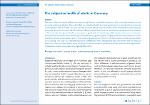The subjective health of adults in Germany
Lampert, Thomas
Schmidtke, Claudia
Borgmann, Lea-Sophie
Poethko-Müller, Christina
Kuntz, Benjamin
The term ‘subjective health’ reflects not only existing illnesses and health complaints, but particularly emphasizes the personal well-being. Studies often collect data on subjective health by asking participants to provide self-assessments of their general state of health. This was also the case with GEDA 2014/2015-EHIS, which employed the internationally renowned Minimum European Health Module (MEHM) as part of the study. Its results demonstrate that 68.2% of adults in Germany rate their general health as very good or good, with the remaining 31.8% rating it as fair, poor or very poor.
The proportion of women who rate their general health as very good or good is slightly lower than the proportion of men who do so (66.6% compared to 69.9%). With increasing age, women and men view the condition of their general health as worsening. The study also identified educational differences which showed that men and women with low levels of education tend to rate their health worse compared to self-assessments provided by women and men with higher levels of education, and in some cases also regional differences.
Files in this item
(CC BY 4.0) Namensnennung 4.0 International
Related Items
Show related Items with similar Title, Author, Creator or Subject.
-
2023-09-07ZeitschriftenartikelMental Health Surveillance in Deutschland Walther, Lena; Mauz, Elvira; Hölling, Heike; Thom, JuliaMit der Etablierung der psychischen Gesundheit als Public-Health-Thema wird auch ihre Surveillance (Überwachung) gefordert. Am Robert Koch-Institut ist daher eine Mental Health Surveillance für Deutschland im Aufbau. Die ...
-
2008-08-29Berichte und sonstige TexteReport: "Health in Germany" Robert Koch-InstitutLife expectancy is rising and the general health situation is good, but the number of people who smoke, are too fat, take too little exercise and/or drink too much alcohol is still too high. These are the main conclusions ...
-
2022-10-26Berichte und sonstige TexteNotaufnahmesurveillance Wochenbericht 01.01.2022 - 23.10.2022SUMO TeamSUMO ist ein am Robert Koch-Institut entwickeltes und betriebenes System, welches Gesundheitsdaten für Public Health-Surveillance verarbeitet und bereitstellt. Der Notaufnahmesurveillance Wochenbericht enthält Daten der ...

